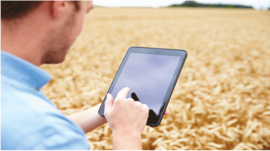And precision agriculture may provide excellent tools for better managing farm resources.
 Savvy commercial farmers recognize that if they harness data related to their individual farm, they can provide their crops with the right nutrients and water, in the right amounts, at the right time -- and thereby have less waste.
Savvy commercial farmers recognize that if they harness data related to their individual farm, they can provide their crops with the right nutrients and water, in the right amounts, at the right time -- and thereby have less waste.
A number of large global technology companies are involved in precision agriculture, because they recognize the potential it has to offer the agriculture industry. Obvious agriculture companies such as John Deere and DuPont have embraced precision agriculture, but many farmers may be surprised to learn that non-agriculture companies are working in the sector as well.
Microsoft is actively involved in precision agriculture, both from a big-farm perspective for first world countries, as well as for micro-farming in Third World countries. They have invested in integrating weather, soil, and other data into systems. Among a number of precision agriculture solutions, Microsoft is pursuing a PlantAnalyzer project – a device which collects plant data (environmental, soil and photosynthesis values) and then stores and analyzes the data.
Verizon has launched an end-to-end agriculture product called Agriculture Technology solutions which, it says, is based on the Internet of Things. According to the Verizon website, “you can remotely monitor crops, livestock and equipment anytime, from just about anywhere. And with reliable, near real-time information you can better prevent spoilage or reduce equipment downtime -- all with less fuel and mileage.”
To drive forward along the precision agriculture path, farmers need to understand the two different components of the precision agriculture puzzle.
They will need to understand their hardware options, such as sensors and equipment to collect the data, and they will need to understand their software options – to collect, process and analyze the data.
Using a spreadsheet won’t cut it any longer. Big farm data will mean that farmers can easily interpret their data and utilize it in a practical hands-on fashion.
